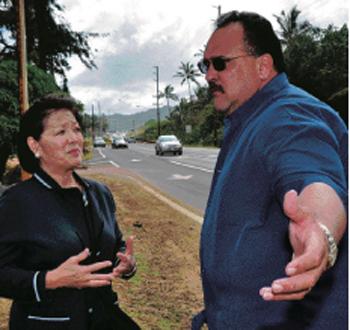LIHU‘E — Three days after casting her vote in favor of the historic $787 billion stimulus package known as the “American Recovery and Reinvestment Act,” U.S. Rep. Mazie Hirono said the legislation will filter more than $1 billion to the
LIHU‘E — Three days after casting her vote in favor of the historic $787 billion stimulus package known as the “American Recovery and Reinvestment Act,” U.S. Rep. Mazie Hirono said the legislation will filter more than $1 billion to the Aloha State in the form of infrastructure improvements, federal assistance for state programs and tax breaks for residents.
The Democrat representing Hawai‘i’s 2nd District described the initiative as “uncharted territory.”
“This economic crisis is real, it’s deep and it’s certainly hit Hawai‘i,” Hirono said Monday, noting the funding would include more than $200 million for infrastructure and transit, more than $200 million for education and $30 million for clean energy in the state. “Believe me, we can use every cent.”
Hirono said 75 percent of the money in the bill would be administered within 18 months, but did not expect the recovery would be completed in that time.
“Most economists say it’s going to take longer than that,” she said. “We clearly need to do more than this act. We have to pursue reform and regulatory changes.”
Hirono said she expects the package to save or create 15,000 jobs statewide in the next two years, which she hopes will stem the tide of job loss. President Barack Obama has said he hoped the stimulus will produce some 3.5 million jobs in the country. Nationwide, the unemployment rate has climbed to almost 8 percent. In Hawai‘i, it has nearly doubled to 5.5 percent in the past year.
Hirono said the fact that 125,000 Americans continue to lose their jobs each week has made her feel the “tremendous sense of urgency and responsibility” to do something to help. For that reason, she said she focused primarily on the infrastructure improvements that are expected to spur the strongest job creation.
“Economists of every stripe — from liberals to moderates to conservatives — have said if we don’t do anything, (the unemployment rate) could hit double digits,” she said. “Not doing anything was not an option. … The only entity that had any ability to inject some money and help the states was the federal government.”
While the federal government is authorizing the stimulus, local leaders like Gov. Linda Lingle, state legislators and county mayors will be making the final decisions on many details of the stimulus plan, Hirono said.
After meeting with Hirono on Monday, Mayor Bernard Carvalho Jr. said he was excited about the stimulus but was still trying to gain clarification on how the money would be administered, what time restrictions would be placed on it and what proposed projects would be getting the go-ahead.
“We were already told if it’s not moving, we’re going to lose it. It will be reallocated,” Carvalho said, adding that he expected to have more information on the plan’s implementation within a week. “We’re at the forefront; we’re going to be the ones to actually make it happen. … We want to make sure that we’re prepared.”
In addition to the so-called “formula-based funding,” the stimulus will include tax breaks of $400 for those making less than $95,000, to be distributed by reducing the federal withholding from paychecks rather than paid out in a lump sum like the program the Democrat-controlled Congress authorized late in former President George W. Bush’s second term. Hirono said the new method of distribution will recycle more of the money through the economy where it is needed.
A press release from Sen. Daniel Inouye’s office estimated there are 490,000 eligible workers in Hawai‘i. With that many recipients, the tax breaks for Hawai‘i workers would add roughly $200 million to the stimulus price tag. Furthermore, the bill calls for the state to receive about $360 million over two years in the form of a temporary increase to the Federal Medical Assistance Percentage for Medicaid expenditures.
Asked if she was concerned about the government debt incurred by such massive spending, Hirono said, “Of course,” before adding that government spending “got us out of the Depression” and “when you have the economy going again, then you create more tax revenue to deal with the deficit.”
Asked if the bill included any unnecessary or wasteful spending, Hirono said there is “no pork” and claimed the stimulus contains “not a single earmark.”
For more information on the economic recovery plan, visit recovery.gov.
Michael Levine, staff writer, can be reached at 245-3681 (ext. 252) or via e-mail at mlevine@kauaipubco.com


